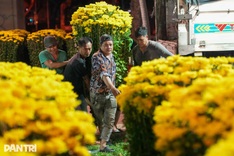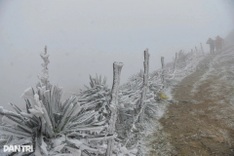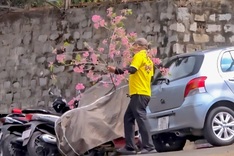In the central Quang Nam Province, the hot topic of discussion these days is how some poor men became multi-billionaires overnight after lucking upon a large quantity of aloe wood deep in a forest four weeks ago.
 |
| Nguyen Thi Van and her family has locked themselves in their house for weeks since her son became a multi-billionaire from aloe resin four weeks ago |
The new rich live in Dai Loc District in the central province where scouring for the wood, which is 10 times more expensive than gold, is the latest get-rich-quick scheme.
Aloe, an aromatic resin secreted by the dó (Aquilaria) tree, an evergreen that grows up to 40 metres tall and is native to India and Southeast Asia, is considered to have medicinal properties and to bring luck (in China).
However, finding it is a difficult task filled with deadly risks since the quest takes people deep into jungles.
No one knows for sure how many people have lost their lives in the endeavor but many talk about neighbors and friends who have set off and never returned.
The dó (Aquilaria) tree, upon being attacked by a parasitical fungus or mold, ignites its immune response by secreting the very rich and dark aromatic resin to form within its heartwood.
The resin crystallizes inside the tree to form the fragrant aloe wood, which does not decay or decompose over time.
Thus, aloe can also be found beneath the ground after a dó tree dies and its trunk rots.
But if a single night’s find can turn a poor person into a multi-billionaire, it can also cause immense trouble or tragedy for the person.
Ms Nguyen Thi Van and her family in Nghia Tay Village, Dai Loc District, in Quang Nam are among those unfortunate victims. Gangs stake out her house day and night to demand a share of her sudden wealth, and she has had to keep her doors and windows locked for weeks now.
On the first trip to look for the treasure last May in Gia Lai Province’s KumKro Mountain, her teenaged son Nguyen Van Sy was preparing food for his six companions in a temporary shelter in a jungle.
He searched around the hut for firewood, and on chopping a stump that looked almost rotten, he perceived a fragrance. On suspicion he had hit pay dirt, he placed a twig in the fire, and an aroma filled the hut.
He rushed out to alert the others.
No one knows the exact amount the group earned but some said that they found hundreds of branches with the resin and that each of the seven made hundreds of billions of dong.
Vo Van Thu, a resident of Hamlet 5 in Nghia Tay Village, confirmed this.
He told Tuoi Tre: “I was one of 50 others rushing to the site to glean aloe behind the seven. I got VND100 million (USD4,900) from selling the leftovers. Some 50 others also earned similar amounts.”

A section of aloe resin
Myth or fact?
Pointing at a nearby temple dedicated to Ba Chua Ngoc (Goddess Ngoc), Thu said: “It is the Goddess who blessed us and many other Nghia Tay residents with riches from aloe wood in the last two years.
“It is rumored that she will bless us for three years.”
The temple is located on a road leading to the village, with its altar always having burning incense and fruits, offerings by the grateful and the hopeful.
“Any man searching for aloe will first come to invoke her blessings for wealth and safe passage,” Thanh, who lives close to the temple, said.
It is not known if the goddess indeed blesses the faithful, but what is definitely known is that many people in Nghia Tay have become rich from aloe in the last two years.
Another intriguing story involves Nguyen Thanh and his companions, all belonging to the H’Re ethnic minority in Dai Loc District in Quang Nam.
While scouring a forest bordering Ba To District in Quang Ngai four years ago, Thanh rested on a flat rock by a stream and slept for a while.
He dreamt of an army of ants competing for a big fortune, Thanh said.
Waking up with a start, he saw an army crawling beneath a rock. He followed them and reached a rotten tree stump by the stream. The 170kg stump was the fortune he had been hoping for.




















